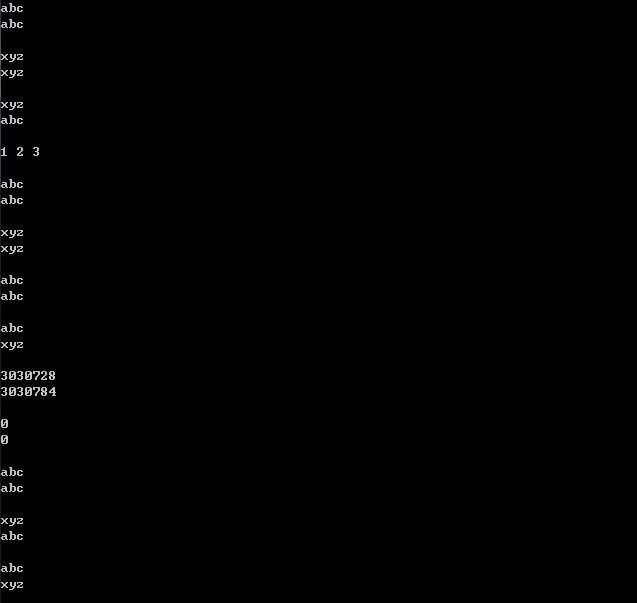结构体的赋值
1.指针的赋值
区分对指针本身赋值和对指针指向的空间进行赋值。
2.数组的赋值
不能对数组名进行赋值,对数组的赋值实质上是数组中元素一个一个的拷贝。
3.结构体的赋值
结构体中的指针
结构体中含有指针时,对结构体赋值类似于指针的赋值,只是浅赋值,如果想深赋值,还需要额外处理。
结构体中的数组
结构体含有数组时,对结构体进行赋值,可以实现数组的直接赋值,而外部的数组不能进行直接赋值,而是一个一个的拷贝。
结构体的直接赋值,实质上是对结构体的完全拷贝,不管结构体中有指针还是数组,拷贝的内容都是结构体本身,也就是说结构体中有指针时,拷贝的是指针本身;结构体中有数组时,拷贝的是数组。
对结构体赋值,可以将结构体内部中的数组进行直接赋值。而直接的数组不能实现数组间的赋值操作。
测试代码和注释:
#include <stdio.h> #include <stdlib.h> #include <string.h> struct st1 { char* p; // 指针 }; void print_st1(struct st1* ps) { printf("%s ", ps->p); } struct st2 { char a[5]; // 数组 }; void print_st2(struct st2* ps) { printf("%s ", ps->a); } int main() { // 指针的赋值 char p[] = "abc"; char* q = p; // 对指针赋值 printf("%s ", p); printf("%s ", q); printf(" "); strcpy(p, "xyz"); printf("%s ", p); printf("%s ", q); printf(" "); // 分配空间 q = (char*)malloc(strlen(p) + 1); strcpy(q, "abc"); printf("%s ", p); printf("%s ", q); printf(" "); free(q); // 数组的赋值 int a[3] = {1, 2, 3}; // int b[3] = a; // 对数组这种初始化失败 int b[3]; // b = a; // 赋值失败,因为不存在对数组的赋值,b是数组名,是一个常量 // 拷贝a中的元素到b中 int i = 0; for (i = 0; i < sizeof (a) / sizeof (*a) && sizeof (b) >= sizeof(a); ++i) { b[i] = a[i]; // 一个一个拷贝 } for (i = 0; i < sizeof (b) / sizeof (*b); ++i) { printf("%d ", b[i]); } printf(" "); printf(" "); // 结构体的赋值 // 结构体中的指针 struct st1 s1; s1.p = (char*)malloc(5); strcpy(s1.p, "abc"); struct st1 s2; s2 = s1; // 结构体的赋值,结构体中的指针 printf("%s ", s1.p); printf("%s ", s2.p); printf(" "); strcpy(s1.p, "xyz"); printf("%s ", s1.p); printf("%s ", s2.p); printf(" "); strcpy(s1.p, "abc"); s2.p = (char*)malloc(5); strcpy(s2.p, s1.p); printf("%s ", s1.p); printf("%s ", s2.p); printf(" "); strcpy(s2.p, "xyz"); printf("%s ", s1.p); printf("%s ", s2.p); printf(" "); free(s1.p); free(s2.p); printf("%d ", (int)s1.p); printf("%d ", (int)s2.p); printf(" "); s1.p = NULL; s2.p = NULL; printf("%d ", (int)s1.p); printf("%d ", (int)s2.p); printf(" "); // 结构体的赋值 // 结构体中的数组 struct st2 t1; strcpy(t1.a, "abc"); // 不能对数组进行直接赋值,所以只能逐个拷贝 struct st2 t2; t2 = t1; // 结构体的赋值,结构体中的数组 // 结构体中有数组,如果对结构体进行赋值,那么其里面的数组也被拷贝,可以看做是数组的赋值 // 但是对于外部的数组直接赋值是不可以的 printf("%s ", t1.a); printf("%s ", t2.a); printf(" "); strcpy(t1.a, "xyz"); printf("%s ", t1.a); printf("%s ", t2.a); printf(" "); strcpy(t1.a, "abc"); strcpy(t2.a, "xyz"); printf("%s ", t1.a); printf("%s ", t2.a); printf(" "); return 0; }
